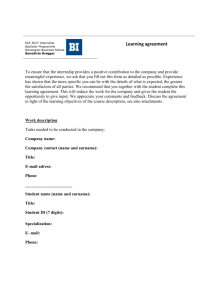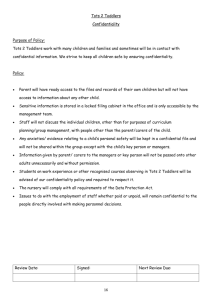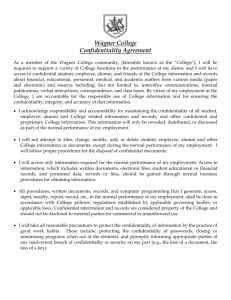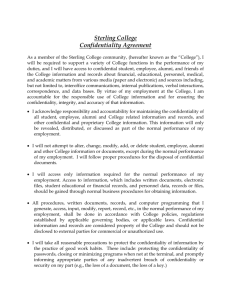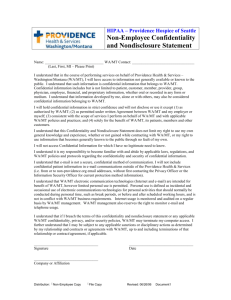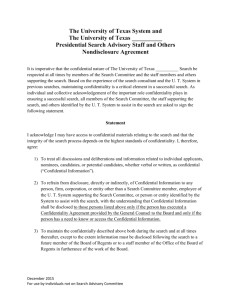Confidentiality Policy – February 2013
advertisement
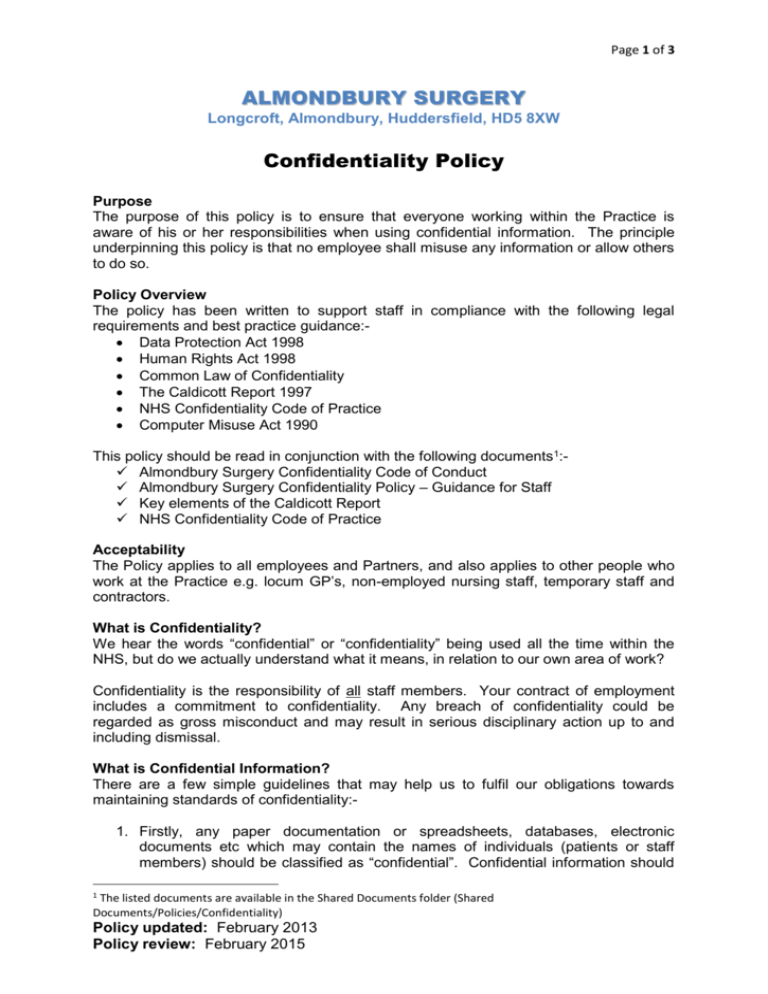
Page 1 of 3 ALMONDBURY SURGERY Longcroft, Almondbury, Huddersfield, HD5 8XW Confidentiality Policy Purpose The purpose of this policy is to ensure that everyone working within the Practice is aware of his or her responsibilities when using confidential information. The principle underpinning this policy is that no employee shall misuse any information or allow others to do so. Policy Overview The policy has been written to support staff in compliance with the following legal requirements and best practice guidance: Data Protection Act 1998 Human Rights Act 1998 Common Law of Confidentiality The Caldicott Report 1997 NHS Confidentiality Code of Practice Computer Misuse Act 1990 This policy should be read in conjunction with the following documents1: Almondbury Surgery Confidentiality Code of Conduct Almondbury Surgery Confidentiality Policy – Guidance for Staff Key elements of the Caldicott Report NHS Confidentiality Code of Practice Acceptability The Policy applies to all employees and Partners, and also applies to other people who work at the Practice e.g. locum GP’s, non-employed nursing staff, temporary staff and contractors. What is Confidentiality? We hear the words “confidential” or “confidentiality” being used all the time within the NHS, but do we actually understand what it means, in relation to our own area of work? Confidentiality is the responsibility of all staff members. Your contract of employment includes a commitment to confidentiality. Any breach of confidentiality could be regarded as gross misconduct and may result in serious disciplinary action up to and including dismissal. What is Confidential Information? There are a few simple guidelines that may help us to fulfil our obligations towards maintaining standards of confidentiality:1. Firstly, any paper documentation or spreadsheets, databases, electronic documents etc which may contain the names of individuals (patients or staff members) should be classified as “confidential”. Confidential information should 1 The listed documents are available in the Shared Documents folder (Shared Documents/Policies/Confidentiality) Policy updated: February 2013 Policy review: February 2015 Page 2 of 3 be available only to those members of staff who have a justified reason to view it, and should be used and stored within a private and secure environment. 2. Secondly, we are all in a position of trust in relation to the information we keep. We must treat any information given to us in confidence as if it were our own. Would you want your bank statements to become publicly known or details of your own health record available to all? Would you be pleased if you overheard a colleague discussing private details from your personnel file? 3. And last but not least, if you don’t have a justified “need to know” as part of your role, then you shouldn’t access any information e.g. viewing patient information systems to check your neighbours birthday or reading through medical notes of an old school friend are entirely inappropriate actions and could lead to disciplinary proceedings being taken against you. The types of information to which confidentiality applies are many and varied, but these could be broadly grouped as follows: Information relating to patients: e.g. medical records, appointment lists, letters to patients, complaints letters or information held on the clinical system (EMIS). Information relating to staff members: e.g. personnel records, wage slips, letters to individual staff members, documents or reports relating to individual disciplinary/grievance procedures. Financial information: e.g. bank statements, invoices, travel claims, reimbursements and payroll data. Organisation sensitive information: e.g. tendered bids, information relating to potential service changes, closure of buildings prior to consultation procedures Any information you receive in confidence Who does this apply to? This policy applies to all personal identifiable information, whether written, computerised, visual or on audio record, or simply held in the memory of a member of staff. It applies equally to staff on permanent, temporary or voluntary placement. Staff remain bound by the requirement to keep information confidential when no longer employed at the Practice. Health care professionals and the staff that support them hold information about people that may be private and sensitive. Patient information is collected to provide care and treatment to individuals and generally must not be used for other purposes without the individual’s knowledge and permission. In the same way information about staff, which is processed for the purpose of their employment should be treated as confidential. Confidentiality should only be breached in exceptional circumstances and with appropriate justification. Main Principles? All staff should ensure that the following principles are practiced: When you are responsible for confidential information you must make sure that the information is effectively protected against improper disclosure when it is received, stored, transmitted or disposed of; Confidential information must only be accessed by you if it is appropriate to the job that you are employed to undertake; Every effort should be made to ensure that patients understand how information about them will be used before they actually supply any confidential information; Policy updated: February 2013 Policy review: February 2015 Page 3 of 3 When patients give consent to disclosure of information about them, you must make sure they understand what will be disclosed, the reasons for the disclosure and the likely consequence(s); You must make sure that patients understand when information about them is likely to be disclosed to others involved in their health care, and that they have the opportunity to withhold permission; If you are required to disclose information outside the team that could have personal consequences for patients or clients, you must obtain their consent. If the patient or client withholds consent, or if consent cannot be obtained for whatever reason, disclosures may only be made where: They can be justified in the public interest (usually where disclosure is essential to protect the patient or client or someone else from the risk of significant harm) They are required by law or by order of a court If you are required to disclose confidential information you should only release as much information as is necessary for the purpose; You must make sure that the persons to whom you disclose information understand that it is given to them in confidence which they must respect; If you decide to disclose confidential information, you must be prepared to explain and justify your decision. If you have any doubts discuss them with the Practice Manager. The Computer Misuse Act 1990 established three prosecutable offences against unauthorised access to any software or data held on any computer. The offences are: Unauthorised Access to Computer Material Unauthorised Access with intent to commit or facilitate the commission of further offences Unauthorised Modification of Computer Material Further help? If you are requested to pass on any of the types of information listed above, and you are unsure whether or not it would be appropriate to do so, check with the Practice Manager. Breach of Confidentiality If you breach confidentiality or allow it to be breached by your actions this will be regarded as a disciplinary matter and you will be suspended while a full investigation takes place. You may also be open to civil prosecution by the patient or patients involved. Therefore it is in your best interest to ensure that confidential information is treated with the necessary respect. Policy updated: February 2013 Policy review: February 2015
